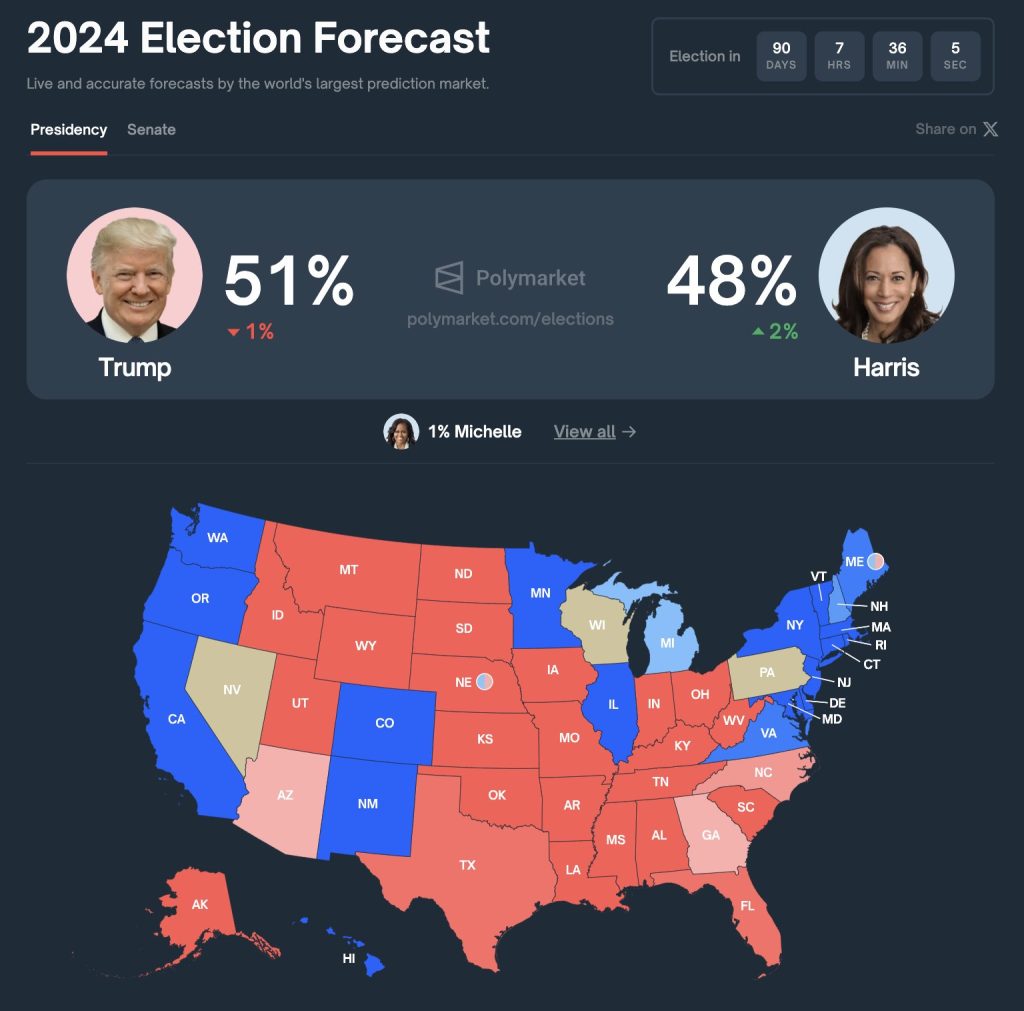SuperEx丨Cryptocurrency: The Biggest Winner of the 2024 U.S. Election

#SuperEx #Cryptocurrency #USElection
As the 2024 U.S. presidential election approaches, cryptocurrency has emerged as a central issue, gaining unprecedented attention in the public and political arena.
The reasons are clear: with mounting concerns about economic stability, inflation, and technological innovation, the allure of cryptocurrency as an alternative financial ecosystem has only intensified. The candidates’ positions on cryptocurrency regulation, blockchain adoption, and the future of decentralized finance (DeFi) are influencing voters across the political spectrum, making crypto a surprising frontrunner in the election’s outcome.
This article will dive into how cryptocurrency has become a key player in the 2024 election, impacting voters, candidates, and the potential trajectory of digital finance in the U.S.
- Click to register SuperEx
- Click to download the SuperEx APP
- Click to enter SuperEx CMC
- Click to enter SuperEx DAO Academy — Space

1. Cryptocurrency Becomes a Campaign Cornerstone
In previous elections, cryptocurrency was a niche topic relegated to discussions within tech and finance circles. However, in 2024, both major party candidates have dedicated significant portions of their platforms to discussing blockchain regulation and cryptocurrency adoption. With over 50 million Americans now owning some form of cryptocurrency, the industry represents a substantial voter base that politicians can no longer ignore. Issues like inflation, banking trust, and personal wealth growth have made cryptocurrency attractive to voters as a hedge against traditional financial uncertainties.
One of the reasons for this shift is the clear division in policy approaches between the candidates. While one candidate advocates for stricter regulation of cryptocurrency to prevent fraud and ensure consumer protection, the other supports a more open framework, positioning the U.S. as a global leader in blockchain innovation. This policy divide underscores the ideological contrast between preserving financial stability and promoting financial freedom, and has attracted crypto enthusiasts and institutional investors alike to follow the race more closely than ever before.
2. Crypto Voters: A New and Influential Voting Bloc
With estimates suggesting that nearly one in five American adults holds cryptocurrency, “crypto voters” have become a newly recognized voting bloc. For many in this demographic, economic issues — particularly inflation and wealth inequality — are central to their support for cryptocurrency as a decentralized, borderless financial system. In states like Florida, California, and Texas, where cryptocurrency adoption rates are high, candidates have tailored their messages to resonate with these tech-savvy, financially-minded voters.
Moreover, younger voters, especially those under 40, who are increasingly engaged in decentralized finance (DeFi) and blockchain technologies, have expressed interest in candidates who understand and support cryptocurrency. This tech-literate and economically-conscious demographic views crypto as not only a way to grow wealth but also as a pathway to financial autonomy. The candidates’ awareness of this group’s importance is evident as they pivot their campaign strategies to address the issues surrounding digital assets, appealing to a generation that values economic opportunity and innovation.
3. Regulatory Stances Shape Voter Perceptions
Cryptocurrency regulation is now a defining policy difference between candidates. The 2024 election is witnessing an unprecedented clash of regulatory perspectives, with one candidate advocating for comprehensive crypto oversight and the other pushing for limited intervention to foster innovation. This divide is fueling debate over the role of government in the financial sector and has highlighted the advantages and risks associated with decentralized finance.
For pro-regulation advocates, the emphasis lies on protecting consumers from potential fraud, scams, and market volatility. They argue that clear, structured regulation will prevent mishaps like the high-profile failures of FTX and other crypto firms in recent years. Meanwhile, pro-crypto voices warn that over-regulation could stifle innovation, urging for policies that encourage responsible innovation without hampering the market’s potential. This tension has mobilized both traditional investors and crypto enthusiasts to weigh the implications of each candidate’s stance on the future of the U.S. crypto industry.
4. Crypto’s Economic Impact and Global Positioning
The stakes of the 2024 election extend beyond the national borders, as cryptocurrency has positioned itself as a global economic force. The candidates’ approaches to crypto regulation will directly influence America’s standing as a hub for blockchain technology and digital finance. With countries like Switzerland and Singapore developing favorable crypto policies, the U.S. risks losing its competitive edge if it fails to create a conducive environment for blockchain innovation.
The candidates recognize the need for the U.S. to maintain its leadership in the tech and financial sectors, which has prompted them to weigh the potential economic impact of their crypto policies. A crypto-friendly approach could attract billions in investment, create thousands of jobs, and foster a new wave of technological advancement. Conversely, stringent regulation could drive innovation offshore, potentially costing the U.S. its leadership position in this rapidly growing field.
5. The Future of Blockchain Beyond Finance
The impact of cryptocurrency in the 2024 election extends beyond finance, as the candidates are increasingly exploring blockchain’s potential in other sectors. Blockchain’s utility in areas such as supply chain management, healthcare, voting systems, and intellectual property is gaining attention. Some candidates have proposed pilot projects or government partnerships to explore blockchain’s applications in public services, arguing that it could bring efficiency, transparency, and security improvements.
This vision of blockchain’s multifaceted utility reflects a broader understanding of how the technology could transform various industries. By adopting blockchain solutions, the U.S. government could drive efficiency in its operations, making it an attractive proposal for voters concerned with government transparency and security.
6. Crypto Campaign Donations and Influence
Cryptocurrency has also changed the landscape of campaign finance. With crypto donations on the rise, both presidential campaigns have received substantial contributions in digital assets. This shift in campaign finance illustrates how blockchain technology is directly influencing political campaigns. The transparency of blockchain also makes it easier to track these donations, which some believe could lead to a new era of transparency in campaign finance.
However, there are concerns about the influence of “crypto whales” or major investors in the election process. Critics argue that these large-scale donations could disproportionately sway the candidates’ policies in favor of crypto interests, leading to a potential conflict of interest. Nonetheless, the influx of crypto donations has underscored the financial weight of the industry and its capacity to shape political discourse.
Conclusion: Crypto’s Role as an Election Shaper in 2024
The 2024 U.S. presidential election has catapulted cryptocurrency from the fringes of the financial world to the forefront of national discourse. The candidates’ policies on cryptocurrency reflect broader ideological differences regarding economic freedom, regulatory intervention, and global competitiveness. As both candidates vie for the support of crypto voters, the election’s outcome could set the tone for America’s future as a global leader in blockchain technology or signal a more cautious approach to crypto regulation.
For the cryptocurrency community, the 2024 election represents a pivotal moment. With both parties recognizing the importance of the digital asset sector, the election is set to shape the regulatory landscape, economic direction, and global positioning of the U.S. crypto industry for years to come. No matter who wins the White House, it’s clear that cryptocurrency has already claimed a significant victory in terms of visibility, influence, and importance on the national stage. As the election unfolds, the biggest winner may not be a candidate but an entire industry that represents the next frontier of financial innovation.






+♡♥★☆♧♣◆◇■□●○•°`~_|§®©※¡¿‧¤:O